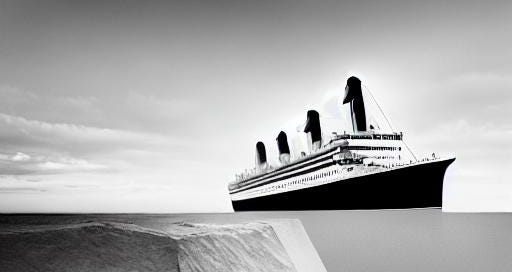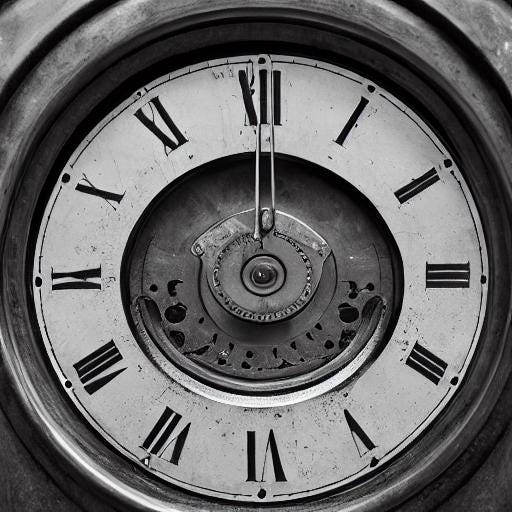What Does This Vaingloriousness Down Here?
On poetry, the loss of The Titan, and the inherent problem with monetary wealth
July 18th, 2023 marks one month since The Titan Submersible imploded, killing all five crew members. What follows are my remarks on the loss of The Titan.
It’s May of 1912, only a month after the shocking loss of the Unsinkable RMS Titanic, and The Royal Opera House in London is holding a glitzy fundraiser for the ‘Titanic Disaster Fund.’ British author Thomas Hardy has been asked to prepare “lines on the loss of the Titanic.” That poem, The Convergence of the Twain (TCOT), is printed inside of every program. If wealthy Gala-goers were expecting a moving elegy honoring the souls lost at sea, then they likely didn’t know Hardy’s reputation for angering audiences with stark realism and a distinct aversion to happy endings. TCOT is not an elegy for the victims, but a brutal roast of the wealth, vanity, and hubris that caused the disaster in the first place. Thomas Hardy did not show up to dazzle the audience with a respectful condolences; he came to excoriate them, sitting in their bejeweled, proper formal-wear. As we approach one month since the implosion of the Titan submersible, this century old poem is shockingly relevant. I’m drawn to the inappropriately cheeky omniscient narrator who opens the poem from the bottom of the sea, at the heart of one month old wreckage.
I
In a solitude of the sea
Deep from human vanity,
And the Pride of Life that planned her, stilly couches she.
If you’re thinking, oh my god, it looks like a ship, me too! We love a concrete poem. The ship has not yet settled when Hardy begins a not-so-subtle attack on the wealthy passengers, referring to only one “she,” which is the sunken vessel itself. She is “Deep from human vanity,” which could be interpreted as all alone and removed from people. But, the speaker could also (and I think more likely) mean Deep from human vanity, or lying deep in the ocean because flawed humans decided to launch an unsafe vessel in the first place. Either way, Hardy omits any reference to the human victims and focuses on the vessel, couching (or sitting) still on the ocean floor.
The narrator continues to assail the recently deceased rich folks and their (now useless) precious objects, noting that eels are slithering “grotesque[ly]” around “mirrors meant / to glass the opulent.” Hardy never claimed to be a crowd pleaser, but it’s the fifth stanza that stands out as a particularly deep needle to the wealthy gala-goers.
V
Dim moon-eyed fishes near
Gaze at the gilded gear
And query: "What does this vaingloriousness down here?" ...
There’s the ship again - neat! And did that fish just say “vaingloriousness?” The fish dispassionately observes the ship’s “gilded” machinery before wondering (as fish do) what many of us have asked recently. What was the wildly expensive and misguided “submersible” doing at the bottom of the sea? How much vanity and hubris and fate-testing does it take to actually name the submersible The Titan? What amount of incredible wealth and resources went into a project for a handful of people to “see” the real thing up close? And why? Thomas Hardy did a good enough job of describing the general vibe down there, and a century later James Cameron captured enough footage for a whole documentary. Like, we’ve seen it.
Part of the problem with having essentially infinite money is constraints. There are none. Billionaires can experience or have any “thing” that currently exists. They can pay for their wildest dreams to be developed. But parameters, paradoxically, help our creativity. Consider the Haiku, a poetic structure from Japan that has been adapted into many languages. One popular English-language version is 3 lines: five syllables, then seven syllables, then five again. It’s fun to play around with structure! We might think our haiku is great, then realize we’ve got eight syllables in the second line - darn it! We harness our creativity to find a way to fit our idea into the form’s constraints, and aha! We’ve finished - and probably enjoyed the experience more than if we were simply asked to “write a poem.” Parameters free us to create within already decided rules. As a disabled person, I try to see the limits of my body and energy in a similar way. These types of constraints make all competition fun - and they form the basis of schoolyard games, sports, scavenger hunts, and many forms of art. Billionaires seem to think that having complete freedom means happiness “at the top.” But what fun is winning when there’s no competition to begin with?
Back to TCOT, in the sixth stanza there’s a record scratch freeze frame reversal, and the narrator becomes a cold, all-knowing, and precise spectator of history. Readers are zoomed out in both time and space to see that while the RMS Titanic was being built, the iceberg was also forming. There’s a bit of a “will they or won’t they” storyline once the iceberg is introduced as a “sinister mate / for her” in stanza seven. We now focus on the iceberg itself as equally important to the Titanic’s story. Hardy stresses that “no mortal eye could see” the extremely twin flame vibes between the ship and the iceberg, as both slowly grow. It’s eventually the God-like “Spinner of the Years,” who need only say one word, “now!” for the unlikely pair to touch, and “consum[ate]” their relationship (just go with it). There was no such metaphor to be found in social media breaking news accounts of the Titan, but callous comments at the predicament of five people evoke shades of Hardy. Hardy was speaking for the general public when he lambasted the wealthy passengers and, today, people on social media freely express their disdain for the dead. I do feel disdain for all billionaires, especially those chasing the stars and depths, ignoring their duty to the collective good. But I also feel sadness for any human being who dies in pursuit of the wrong treasure. Hear me out.
The “billionaire class,” (which is far too cute a name for the few individuals hoarding, to quote Hardy, a grotesque amount of money) seem to believe that opportunities to view noteworthy cultural object “up close,” are inherently valuable because the chance is only available to the elite few. The rest of us couldn’t dream of such an experience! This worldview is the inherent problem with monetary "success”. Those with outrageous monetary abundance easily forget that there are other types of abundance, like spiritual abundance, an abundance of love and belonging, an abundance of hope, of joy. Poets and artists have always had the ability to cut through a culture’s obsession with money. “The Convergence of the Twain” shows us all a person ever needs to “see” from the Titanic disaster, and it’s not the wreckage. What Hardy provides in his poem is a reminder to not get too caught up in our shiny objects, our things, no matter how special they may seem.
There are eleven stanzas in Hardy’s poem, each preceded by roman numerals, similar to a clock face. Paired with the many references to time (“Spinner of the Years,” “for the time far and dissociate”), the fact that the poem never makes it to twelve is significant. For the paying guests at the fancy benefit, Hardy seems to be saying: “Your rich buddies didn’t make it to twelve. Enjoy your Beef au Jus.” Classic Hardy. But it’s Emily Dickinson, herself well-known for writing within constraints of her own creation, who famously noted that she “never saw a moor,” or the sea. Yet, she still knows these landscapes intimately because of imaginative descriptions and artist’s renderings. She ends that poem with even more certainty of things she’s never seen: “I never spoke with God / Nor visited in Heaven —/ Yet I am certain of the spot / As if the Checks were given —.” Dickinson knew that we can have an abundance of faith, of joy, of hope, of belief in places we’d never see without ever having to visit them - and she knew all of this without an abundance of wealth. Somebody should tell the billionaires.
Erin Ryan Heyneman is a disabled educator, creator, and speaker. She also serves as a Commissioner on her city’s Commission on Disability. Find out more about Erin and her work here.






Loved this! So on point for this late stage capitalist hellscape.
Never knew about that poem or the “benefit gala”. Amazing! But I do love the connection you made back to restraints and its ability to actually curate creativity. People so often ask for “freedom” because rules stifle creativity. Which in some cases they do. But without some parameters where is the challenge?!